David Budbill, Moment to
Moment
Port Townsend:
Copper Canyon Press, 1999.
Joel Weishaus
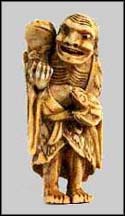
1.
In late September, 2005, while
attending a conference in Port Townsend, WA, I wandered into
the offices of Copper Canyon Press. I had reviewed several of
their books for various newspapers and magazines, and respected,
and still respect, their choice of poets. So when I saw a new
book with the reclusive 8th Century Chinese poet, Han-shan, on
its
cover, a seminal figure to me, I asked for a copy. This was
David Budbill's, While We've Still Got Feet.
When I retuned home and I
began to read it, my heart dropped. I was ready to write the
publisher and say that I could not spend time with these poems;
but first
went to the library and borrowed Budbill's earlier collection, Moment
to Moment. After reading it, I decided to explore some issues
both these books raise.
The time between
times
is
the link our neurons make,
the
chemic leap over a chasm
we
only think we take.
2.
A few
years ago I walked this trail easily. Now my breath comes
fast, feet painful,
sweating, almost from the start of
the long walk in. Drawn to earth's pungent scents mixed
with wiffs of woodsmoke, leaves float down as the path
rises through
autumn's early morning mists. To
be wet is to live both inside and out.
Most
people still worship the sun, as if their skin were green.
I shine when peaks
are hidden and the Mystery draws its forms in roiling
clouds.
Thus, Budbill and I begin with "How He Writes" on
a "gray and drizzling day/here
on Judeville Mountain./The birds and the
wind are still/and he too so dolorous and
quiet/even his breath seems shrill." Written
in the third person, it recalls for me that at the
time Budbill was beginning his eremitic life in Vermont,
another "hermit" poet
was exiting his in California, leaving a parting
note: "I
never could make anything work out right
and now I'm betraying my friends. I can't make anything
out of it—never
could. I had great visions but never could bring
them together with reality. I used it all up."
Budbill
continues:
His
life is a vessel
of silence
into
which now voices
begin
to flow. Slowly the vessel fills
like
water filling a well...(p.5)
Even
as one life ends, another begins; not
really a beginning, but a move, an affirmation. “What
a thing it is to sit absolutely
alone, in the forest, at night,
cherished by this wonderful unintelligible,
perfectly innocent speech, the
most comforting
speech in the world, the talk that
rain makes by itself all over the
ridges, and the talk of the watercourses
everywhere in the hollows!" But Budbill
is not alone. He has a wife. Just
as Thomas Merton's hermitage was
on the
monastery's grounds. There are
those few who live
a truly sequestered life, as the Chinese
hermit who asked his American
guest, “Who’s
Mao?” But Henry Thoreau's
mother cooked her son's meals,
as his prodigious
literary skills didn't extend to
the culinary.
In the backcountry of northern
California, the poet Gary Snyder
is surrounded by
family and friends. Even Han-shan
would come to the temple to warm
his hands and talk with the monks.
Are we
ever alone? Are we ever not alone?
Frost
fondles cheekbones and pinches my nose. Leaves
crunch beneath boots that have gathered dust
over summer. Gaining strength from early
rains, the creek carries me downstream, while
I remain in place. With the cool air, the
forest seems happy again. Or is it me?
Always
in these ancient Chinese
paintings, the rocks, the sky, the fog,
the endless
mountains loom
over
the tiny humans... (p.7)
|
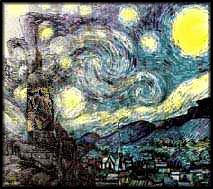 |
climbing
up that narrow mountain path, up and up,
fading into
those remote
and towering mountains...
|
3.
On a bright day in early October, 1972, I hiked up a trail lined with boarded-up
summer homes to a small cabin. Above, fresh water rose from the pine and
oak forest and made its way down, through pipes to the cabin, or around,
then 100 miles south to thirsty homes in San Francisco. The kitchen had a
refrigerator, the main room had a good wood stove, the bathroom was off a
back porch built on stilts. This was my hermitage for one year.
Why
have I stayed here all these years
among these mountains far from the city? What keeps me here
in this lonely place separated from the world I love? (p.43)
No phone, no TV, one night,
bouncing from one dark tree to another, a disembodied voice
announced that Picasso was dead, as if Great Pan had died again.
Then it occurred to me that, like Einstein, Picasso had been
alive during my lifetime! Who should I visit before they're
gone too? For now walking
down the mountain for the mail, left by the side of a road "less
taken," would be the journey of my days.
"rost
definitely was a guide. And when he died in 1962,
I had read everything he had ever written, and had been
written about him; I was devoted to him. This was while
I was still living in Ohio, long before I ever came to
Vermont. I think coming to Vermont requires of writers
a kind of divorce from Frost, if you're going to be yourself."
Frost
comes at night
and is gone
in the morning...
I wasn't prepared for winter,
which was already in the air. The tenant before had only left
a cord of wood. As the cabin's walls were hollow, I knew I'd
need much more. As it turned out, it was to be the coldest, snowiest
winter in forty years.
Snow comes
in winter
and is gone in spring....
Is being oneself a matter
of insulation, the cozy illusion of thinking original thoughts?
Or is it learning how to absorb the canon and shape it by the
heat of your own psyche, tempered with experience? The door to
creativity is hinged on both sides. But every biography, no matter
how gifted the subject, has the same ending.
For us, if
we're lucky, there is only this
slow, painful going
away. (p.65)
|
Each autumn, deciduous
leaves dress in yellow mottled with brown spots of age,
and uninhibited red...
are slowly absorbed
into the earth, or huddling on faceless pavement, are bagged
and hauled away.
|
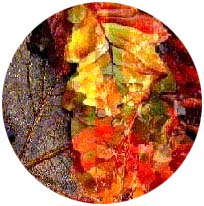 |
4.
Sitting on a splintery wooden
bench, writing by a soft October light, pine
needles lay dying on grass sparkling with dew. People drift
past, looking higher, to wilting darkening rows of roses.
I visited my father a year
before he passed away. Lost between airport and apartment—I
hadn't been to Ft. Lauderdale for twenty years—, it was
midnight when I arrived. Hearing voices in the livingroom, he
woke up and walked in, asking Mother, “Who’s that
man?” “He’s your son,” she replied.
The death of any
man’s father opens up for him the great abyss
of inevitable death
on the edge of which he stands without a mediator. The son whose father died
is now
in an inexorable ‘next’ position and feels, on whatever level of
consciousness, his own
mortality in his bones.
"What I Did Today:
The Sixth of May" (p.88) is
a list that begins, "I stacked rough-cut lumber," and
includes, "I thought of my father's death." The next
line is, "I thought of my own death," followed by, "I
took a nap" — the kind of sarcastic, self-depreciating
humor that undercuts much of this poet's work. In contrast,
in While We've Still Got Feet, Budbill writes
what might be the best passage in both these books —
I've got my
father's ashes on my desk
in a little brass urn so I can look at them
every morning before I start work, so
I can pick them up and shake them, hear
what's left of him rattle around in there,
the larger pieces of bone and tooth claking
against the side of that little brass urn. (p.21)
Music
ascends, and a dead leaf falls, as the sun illuminates spider’s
web spun between the arms of two deciduous trees.
There’s this emphasis on off-the-page and
in-performance poetry—among ancient poets,
non-academic, non-white poets and current performance
poets. I’ve got at least one of my feet in
that tradition. It’s a different kind of
poetic tradition. As I grow older, I want to cross-over
more and more to that.
Can a poet of our time reach
a multivalent audience "not
specializing in literature, with many members who lack
the training to unlock hermetic verse," without sacrificing
the work's layers of cultural and linguistic horizons? Most
who try fail. Those who are successful usually exhibit a naturally
cadenced line, preferably long, with the poet's life focused
on surviving between winks of the public glare—while Budbill retreates
to the mountains of northern Vermont.
|
Recluses
were the personifications of the mountains
themselves, lonely, untamed, unkempt—storehouses
of the secrets of nature. Caves, huts, and mountain
temples were their lairs.
In
some cases,
they
even took, and are
now only known by, the name
of the mountain on which they lived.
Thus, Han-shan means "Cold Mountain."
Although, "it
is odd that he called himself Han-shan, when,
in fact, the place where he lived was never called Hanshan,
but rather Cold
Cliff."
|
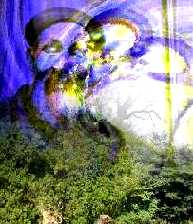 |
5.
Han-shan makes an appearance
in many of Budbill's poems, to the extent that the initial
section of While We've Still Got Feet is written
in the spirit and beat of some translations of his poems,
with
Judeville Mountain, where Budbill lives, substituted
for Cold Mountain, or Cold Cliff, "a
two-day walk from the East China Sea."
|
Sometimes
people ask me how to get
to Judevine Mountain.
I can tell you how to
get to where
the road ends, but when
you get there, you've
only just begun.
After that I can't be
any help at all. It
takes years to find
the way. And anyhow...
|
|
Men ask the way to Cold Mountain
Cold Mountain: there's no through trail.
In summer, ice doesn't melt
The rising sun blurs in swirling fog.
How did I make it?
My heart's not the same as yours.
If your heart was like mine
You'd get it and be right there.
|
Red Pine opines that the
poet we know as Han-shan found himself in the employ
of a man who was on the wrong side of the An Lu-shan Rebellion
of 755.
In danger of being executed along with his boss, the
young man left his wife and family for Kuoching Temple in the
Tientai
Mountains. Even so, we're not sure exactly when he lived. "The Kuang-t’ing (850-933)…says
that Han-shan returned to the T’ien-t’ai Mountains
during the reign period ta-li (766-779). Tsan-ning, on the
other hand, felt that Han-shan, Shih-te, and Lü-ch’iu
Yin all lived during the reign of Jui-tsung (710-712)…And
looking further into
Sung and Yüan sources,
Hu Shih notes that the meeting of Lü-ch’iu
Yin and Han-shan is variously placed in 633, 642, 643,
712-713, and
right around 800."
Budbill's poem, "The
Story of Chi Mu Chian," tells
the story of another poet who left the city "and went
into the mountains knowing he was a failure.” Not only
was he forgotten, his poems were “lost forever,” which
Bubbill attributes to they not conforming
to
the fashion of the time,
nor
did they obey the rules of the academy. His poems
were plain and simple, so blunt and common the literati
didn’t even see them.
Only people who
didn’t matter loved his poems. (p.34)
This theme is taken up again
and again, as if the poet were excusing himself as to why in
the future his poems will molder in the canon's fine
sieve.
In a generous interview
with poet David Meltzer, Lew Welch tells how Po-Chü-i,
one of China’s greatest poets, and a possible contemporary
of Han-shan, would engage in conversation a peasant lady, “ who
was illiterate but very very smart,” during which
he would “dump the poem on her and if she didn’t
recognize that he had just said a poem, he figured that he
had written it right." Budbill’s poem, "An
Age of Academic Mandarins,” is probably
based on this interview:
Ah, Po Chü-i,
how they would laugh at you,
My friend, standing there in your kitchen
testing your poem on your illiterate cook to see
if it is plain enough so that she and people like her
will be able to comprehend what you have to say. (p.74)
We live in a different era
than the one Budbill (and Welch) subscribes to, in which illiteracy
is not acceptable, no matter how poor the person. "Testing
your poem on your illiterate cook to see/if
it is plain enough so that she and people like her..." says
more about the social conditions of that time, including the
subjugation of women, than about the quality of the poem. But
Welch then goes on to say: “At the same time, that very
poem would have more literary references in it for the literate
reader than we can imagine today.”
Although oral poetry may
have been plain-spoken, written language, for "the literate
reader," is a means of complexity, which is the unfolding
of nature itself. Written langauge “for
example, didn’t record oral language; it was a new
language, which the spoken word came to imitate.” From
a different angle—
Whereas language processed
visually is here-and-now stuff of great density; acoustical
language permits
a level of abstraction that creates a higher inclusiveness, achieved
by a necessary dropping out of detail.
Since the Beat aesthetic
of written-to-be-spoken words, carried out brilliantly by Lew
Welch and others, there has been a return to poetries written
to be read on the page, some of a density relevant to linguistic
research. Of course,
this is not the only approach that extends language and deepens
culture.
eighth
century or twentieth,
Cold
Mountain
or Judeville
Mountain—
what’s
the difference? (p.52)
In both
East and West, poetry traditionally carried the myths,
folk tales, songs, philosophies, and sciences. Although every poem
is an alternative aesthetics,in
an era of computers, multimedia and mass transmission
technologies that link academic and lay terminals,
undreamed of unstaged performatives are materializing.
|
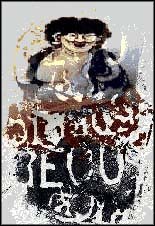 |
6.
This poet should be praised.
He dared to leave his parents' House-of-Belief and take a few
steps east, raising the question: Can someone born into a theistic
religion and culture grasp the essence of non-theistic Buddhism,
and understand the cultures it generated? Can neurons connected
in childhood later be circumvented? Or, as we approach death,
does the depth of our psyche run in reverse?
While most
of these poems fail as literature in the canonical sense, Budbill
plods on, his failures like chunks of mud sticking to the soles
of his boots. “We
might mention that the Japanese word for ‘walk’ is
the same word which is used to refer to Buddhist practice;
the practitioner [gyoja] is then also the walker,
one who does no reside anywhere, who abides in emptiness.”
They say
Ryokan’s
brushwork
was unaffected and free-flowing
That’s
the goal of these poems:
no duplicity, or guile,
Just simple,
honest,
direct, and free. (p.36)
Bullbill’s poems are
read by popular radio personality Garrison Keillor on his show, "The
Writer's Almanac." Reviewing Keillor’s recent anthology
of his favorite poems, Good Poems for Hard Times (Budbill
was in the first book, Good
Poems, but not this one), David Orr wrote: "According
to Keillor, 'Poetry is the last preserve of honest
speech. . . . All that matters about poetry to me now is directness
and clarity and truthfulness. All that is twittery and lit'ry:
no thanks, pal.’" "Well, (Orr continues) fair enough,
pal. Of course, in the literary world, directness and clarity
and
truthfulness are themselves matters of artifice, but a man is
entitled to his preferences."
Nothing is simply honest,
but "a
language of relations, which consists of expressive movements,
paralinguistic signs, breaths and screams, and so on—with
modulation, never moderation." The brain is continuously
reshuffling its codes. We are always role-playing, unless we
are free of ourselves, and few have accomplished this except
in a few extraordinary moments. But what of poetry? Without its
texture, the gravel in its voice, the
arrhythmia of its heart—it deteriorates into self-indulgent
speech acts, confession without unique expression. What is heard
is what Thomas Merton called “the anxiety to be heard.”
David Orr continues: "The
meaning of poetry is poetry. But a more subtle and intractable
difficulty is that Keillor's taste isn't just limited, it's limited
within its limitations. He likes plainspoken writing that is
long on sentiment, short on surface complication - a defensible
aesthetic, if one that occasionally condescends to its subject
matter and audience." This is followed with a pun on Keillor's "A
Prairie Home Companion" radio show's signature signoff: “But
great poets often produce mediocre work, bad poets can be surprisingly
good, and very good poets are frequently no better than consistently
above average.”
Judeville Mountain
really isn't that much.
It's higher than some of its neighbors, lower
than lots of others. It's not lofty or difficult.
It never has its head in the clouds. (p.18)
Winds finally sweep the haze
and fog west, toward the ocean. For the first time in a week,
Mount St. Helens appears, with snow and ice up to its truncated
summit, fissures
running down its slopes. I say to a friend, "If the mountain
blows today, we'll have a clear view of it." Late afternoon:
smoke and ash.
|
Running through both
books is a stream of complaints about aging, poverty, and
not being recognized in academia's testy eyes. I suspect Budbill's
knowledge is more profound than his poems, but this is
what he lets us see. In, "After Reading Meng Chiao's
'Seeing Off Master T'an,'" he writes: What
I can't comprehend is how
Master
T’an could grow old, hungry, and neglected
because of poetry,
yet never dry up, never
become
nasty, sarcastic, or bitter. How did he keep his innocence? (p.27)
|
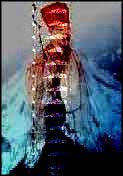 |
Of Meng Chiao,
the great Sung Dynasty poet, Su Tung Po, said: “His
every poem came from his heart and marrow—passionate,
sincere, and more than a little bitter. Su Tung Po also began
one of his two poems on Meng Chiao’s poetry with the line, ‘I
can’t stand the poems of Ming Chiao.’”
References
Note: Unidentified
page numbers in the text refer to While We Still Got Feet. D.
Budbill, Port Townsend: Copper Canyon Press, 2005.
2.
another
"hermit poet": See, "Hermit
Poems." In, Lew Welch: Selected Poems.Grey Fox
Press: San Francisco, CA, 1982. pp.34-43. Lew
Welch disappeared on 24 May 1971. He had been "locked in a deep depression,
heightened by the course of antibuse (for alcoholism) he was taking and
by the difficulties he faced trying to raise funds and muster a crew
to build a cabin in the woods. His revolver was missing, Gary
(Snyder) said, so he must have taken it with him and found
a final resting place in a thicket high in the foothills of
the Sierra Nevada. His body was never found." D. Allen. In, Hey Lew:
Homage to Lew Welch. M. Cregg, Editor. (Privately Published: Bolinas,
CA.,1997.) p.85.
What a thing it is: T.
Merton, “Rain and the Rhinoceros.” Raids
on the Unspeakable. New Directions: New York, 1966. p.10.
3.
Frost
definitely was a guide: D. Budbill. From, "Back There:
A Conversation with
David Budbill." Rivendell. Summer, 2003. (He
is speaking of the poet Robert Frost.)
4.
The
death of any man's father: R.
R. Gunn, Journeys
in Emptiness: Dogen, Merton, Jung and the Quest for Transformation.
Paulist Press: New York, 2000. p.113.
Music ascends: "Well,
I fell in love with jazz when I was about 12 years old in junior high school.
I was 12 in 1952, and, for reasons I can't explain...Why I got obsessed
with this music I don't know. But I remember very clearly sitting in my
room getting stoned out of my mind listening to Gerry Mulligan's Tentet, maybe
it was the harmonies, the rhythm, the swing; I don't know what it was, but
that stuff blew my mind. The more I listened, the more I wanted to l isten. It took me away from my life. It was like traveling in outer space.
I wasplaying trumpet at that time. My interest in jazz just grew and grew
and it's never stopped growing." D. Budbill. From, "Back There:
A Conversation with David Budbill." Rivendell. Summer,
2003.
There's this emphasis: David Budbill. From, "Back
There: A Conversation with David Budbill." Rivendell,
Summer 2003.
Not specializing in literature: A,
Schelling, “How
the Grinch Imitated Gary Snyder.” Sulfur 13 (1985). pp.157- 161.
Recluses: V. Cass, Dangerous
Women: Warriors, Grannies, Geishas of the Ming. Rowan and Littrlefield:
Lanham, MD, 1999. p.17
it
is odd that: Red Pine (Bill Porter), The Collected Songs
of Cold Mountain.
Copper Canyon Press: Port Townsend, WA, 2000. p.13.
Cold
Cliff: "Among
the Evenki (Tungus), there were cliffs (bugady) that served
as clan sanctuaries at which the most important social activities and
public clan-worship were conducted ...In Siberian ethnography generally,
cliffs are held to be the dwellings of totemic divinities." A.I. Martynov, The
Ancient Art of Northern Asia. Urbana, IL., 1991.
5.
a two-day
walk: Red
Pine (Bill Porter), The
Collected Songs of Cold Mountain. Copper Canyon Press: Port
Townsend, WA, 2000. p.4.
Sometimes
people ask: From, "Directions." While We've Still Got
Feet. p.11.
Men ask
the way: G. Snyder, Translator, "Cold
Mountain Poems." Riprap, & Cold Mountain Poems.
Four Seasons Foundation: San Francisco, CA, 1969. p.43.
The Kuang-t’ing: R.
G. Henricks, The
Poetry of Han-Shan. State University of New York Press: Albany,
1990. p.5.
who was illiterate: The
San Francisco Poets.
D. Meltzer, Editor. Ballantine Books: New York, 1971. pp.189-227.
for example: E. Carpenter, “The
New Languages.” In, M. McLuhan and E. Carpenter, editors, Explorations
in Communication. Beacon Press: Boston, MA, 1960. p.162.
whereas language: T. McKenna.
In, R. Sheldrake, T. McKenna, R. Abraham, The Evolutionary Mind.
Monkfish Book Publishing Company: Rhinebeck, NY, 2005.
p.36.
6.
We
might mention: A.G. Grapard, “Flying Mountains and Walkers
of Emptiness: Toward a Definition of Sacred Space in Japanese
Religions.” History of Religions, February
1982. p. 206.
Keillor's anthology of his favorite poems: G.
Keillor, Editor, Good Poems for Hard Times. Viking Books:
New York, 2005.
Budbill was in: G. Keillor,
Editor, Good Poems. Penguin Books: New York, 2003.
David Orr wrote: “Hit Parade.” Review of, Garrison
Keillor, Editor, Good Poems For Hard Times. The New
York Times, 13 November 2005.
a language of relations: T. Lamarre, "Diagram,
Inscription, Sensation." In, B. Massumi, Editor, A Shock
to Thought. Routledge: London, 2002. p.165.
His every poem: M.
O’Connor, When I Find You Again It Will Be In Mountains:
Selected Poems of Chia Tao. Wisdom Publications: Boston, MA,
2000. p.5.
|